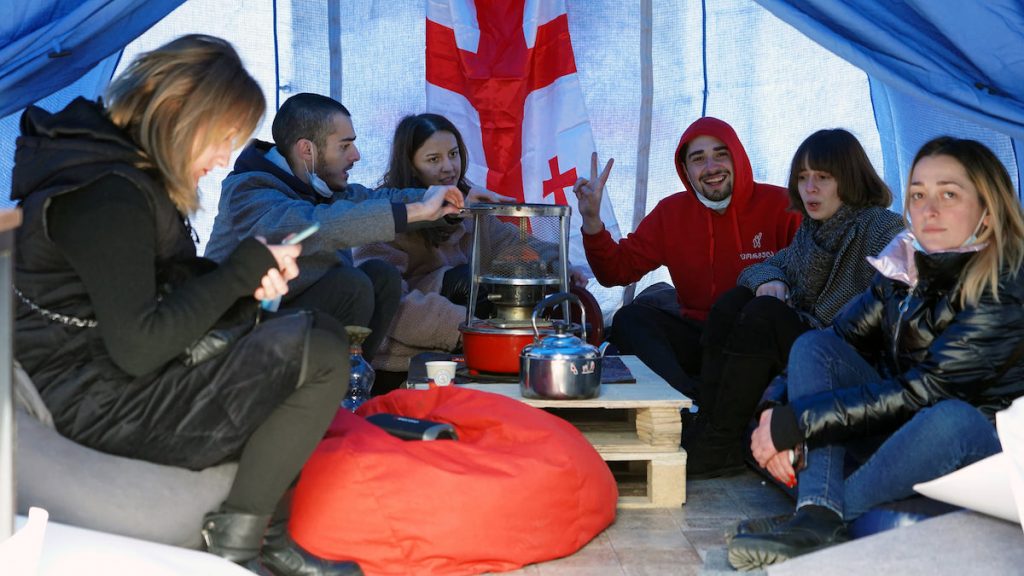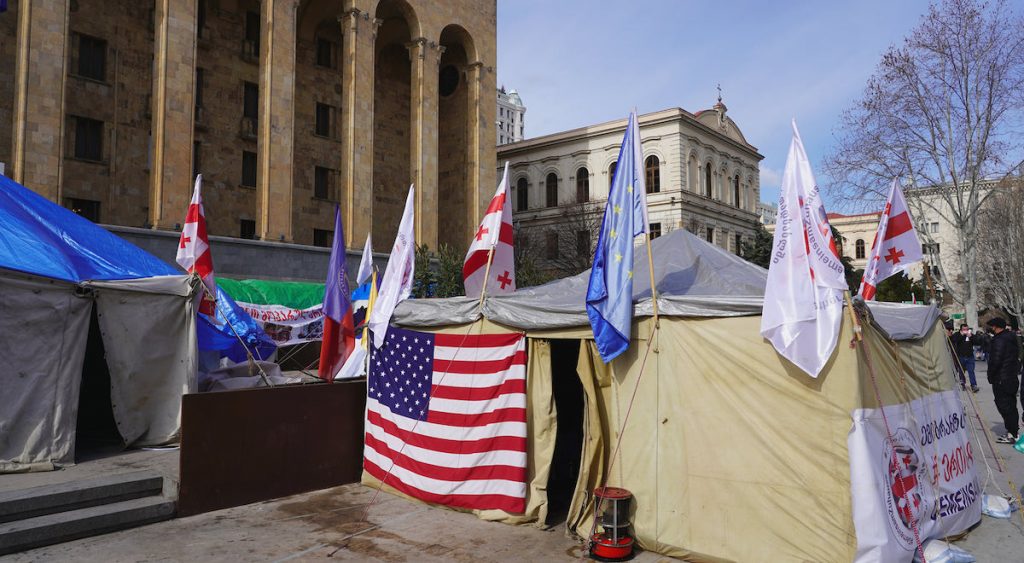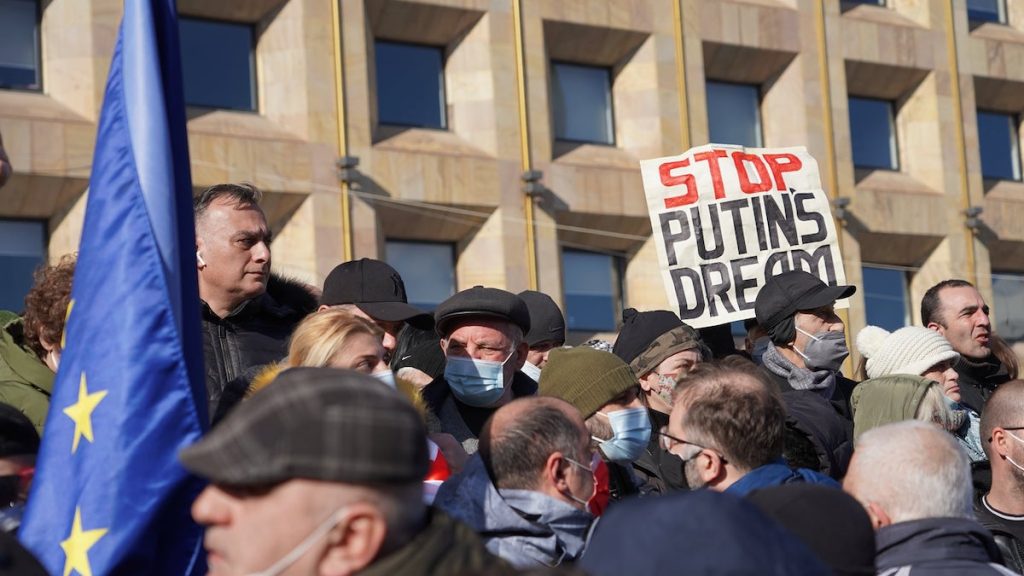Georgian opposition decides to stir up the regions
Political crisis in Georgia
The opposition in Georgia has ‘gone into a state of emergency’ and plans to conduct rallies in the regions.
On May 15, the leaders plan to return to Tbilisi and hold a mass protest on central Rustaveli Avenue.
The expert community is divided. Many say the opposition has no choice but to stir discontent. Others call politicians both in power and in opposition ‘gambling addicts’ and warn that they are all heading for political bankruptcy when the population simply does not go to the polls.

Opposition leaders said they have been forced to make the decision to go into a state of emergency after the ruling Georgian Dream party failed negotiations with the opposition and effectively thwarted the mediation of Western partners.
“We will go to every city, every village, come to every family and convince the population that this fight really makes sense,” said Zaal Udumashvili, one of the leaders of the leading opposition party United National Movement (the party of the former president of Georgia Mikheil Saakashvili).
One of the leaders of the European Georgia party Gigi Ugulava warns: “If we cannot agree with the authorities on new parliamentary elections, then we will force them to hold these elections. Ahead is complete protest and disobedience. It will take several months, we need strategic patience. “
- European mediation between Georgian opposition, gov’t ends without result
- ‘Only Moscow is happy’ – Western diplomats to Georgian gov’t
- Who is Garibashvili – Georgia’s former, soon to be new PM
Briefly about the political crisis in Georgia
The united opposition declared the parliamentary elections from October 31, 2020 rigged and began demanding new elections. Opposition MPs (with the exception of six) resigned from their seats in parliament. As a result, for the first time in the history of Georgia, there is actually a one-party parliament, where only the ruling Georgian Dream party is represented. The authorities consider the elections valid and refuse to appoint new ones. All international organizations and diplomatic missions also believe that the elections were free, although they were held with many violations.
The situation escalated sharply on February 23, 2021, after the authorities carried out a special operation, broke into the building of the leading opposition party, United National Movement, and arrested its leader Nika Melia. After that, the Prime Minister of the country, Giorgi Gakharia, resigned, who was against the arrest of Melia, but was in the minority in his team. Georgia’s American and European partners said the authorities had taken “a step back on the road to democracy.”
The opposition has two main demands – the appointment of early parliamentary elections and the release of Nika Melia, as well as other oppositionists. Several rounds of talks have already taken place with the facilitation of the US Ambassador and other diplomats accredited in Georgia. The moderator was also one of the most influential European officials, President of the European Council Charles Michel. Then, for almost a week, the talks in Tbilisi were facilitated by his personal representative Christian Danielson, and Prime Minister Irakli Garibashvili was invited to Brussels to discuss the situation.
But all the meetings and tours were in vain. Both sides, the authorities and the opposition, accuse each other of disrupting the negotiations.

Ruling party: ‘The opposition is the language of ultimatums and the influence of [ex-president] Saakashvili’
Irakli Kobakhidze, leader of the ruling Georgian Dream party, accused the opposition of “speaking in ultimatums. One is directly related to the violation of the rule of law, while the other directly contradicted the interests of the state.”
“Failure to reach an agreement for the opposition was an end in itself,” Kobakhidze said.
He did not specify what kind of ultimatums were in question, but apparently these are the two main demands of the opposition: the holding of early parliamentary elections and the release of political prisoners.
Kobakhidze also said that in the negotiation process, the opposition has actually been headed by former Georgian President Mikheil Saakashvili, and the leaders could not make decisions on their own. “That was the main reason why they ultimately refused to reach an agreement [with the authorities],” Kobakhidze said.
“One part of the opposition wants Georgian Dream to compromise on important legal principles. We are convinced that we should not turn our backs on our citizens just because the radical part of the opposition does not like the election results. It is impossible to come to an agreement with such an approach, ”said Speaker of the Parliament Archil Talakvadze.
Who is to blame and what will happen next – expert comments
Observer Zaza Piralishvili on the breakdown of negotiations between the authorities and the opposition, which were mediated by the European Council.
“What has been happening in our politics for several months now is the manifestation of a political gambling addiction, nothing more. And sooner or later the gambler faces bankruptcy. It doesn’t take big prophecies to understand that we have received some kind of ‘festival of political immaturity.’
The bottom line will be this: neither side will be able to get massive support. Local elections due in 2021 will end in unprecedented voter passivity, especially in major cities. And parliamentary elections, early or at their usual time, will also be called into question.
The important mediator [Personal Representative of the President of the European Council Christian Danielson] has left. European diplomacy has exhausted its resources. The government and opposition together have created a Georgian analogue of Lukashenka’s rule in Belarus and don’t even realize it. What is the way out of this situation? I dont know”.

‘Politicians in Georgia must come to a solution’ – the West will continue to help in solving the political crisis
“Ultimately, the responsibility for resolving the political crisis lies with the Georgian political actors. This is important for the democratic consolidation of the country and for its European aspirations, ”said Personal Representative of the President of the European Council Christian Danielson, leaving Georgia on March 19 to continue consultations in Brussels.
European Parliament President David Sassoli proposed to create an informal contact group for European MPs working on issues related to Georgia.
Special hearings on the state of democracy in Georgia will be held on March 23 at the US Senate Foreign Relations Committee chaired by Senator Jean Shahin. The meeting will be addressed by Deputy Assistant Secretary of State George Kent and Bureau of Democracy, Human Rights and Labor Officer Cara McDonald.


















